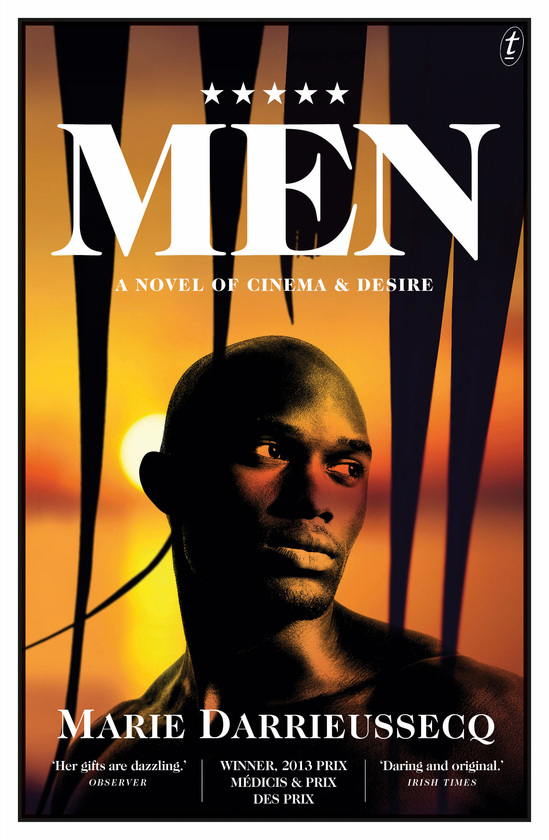Men
A Novel of Cinema and Desire
by Marie Darrieussecq
Translated by Penny Hueston
Text
Paperback, 272pp, 2 May 2016, ISBN: 9781925240917
Marie Darrieussecq’s writing is at once racy and contemplative. Her latest book, Men, is a perfect example. While it may appear frivolous, it’s anything but, working against a series of opposing images: time vs space, perspective vs obsession, and the distortion of stereotypes in a way that is post-modern and transgressive. As the subtitle suggests, the plot takes the form of a Hollywood love story between a beautiful female actress and an actor/director. Solange, who we first met in Darrieussecq’s novel All the Way, is French and Kouhouesso is a Canadian born in Camaroon. Solange becomes more and more obsessed with Kouhouesso, and he reveals that he is planning on directing a version of Conrad’s Heart of Darkness, to be filmed in the Congo – an almost impossible task. Right from the start the book takes on a light-hearted humorous tone through the structuring of short chapters, the “Opening Credits”, funny titles, and dropped names that include Oprah, Gwyneth Paltrow, Matt Damon, and an elegant character named George, who is clearly George Clooney right down to the Nespresso ads. Champagne, foie gras, and truffles are abundant, along with cashmere, perfume, and limousines. The superficial glamour is offset by the poetic interiority of Darrieussecq’s language:
Every morning she woke up afflicted with a skin disease. Her shoulders, her breasts, the insides of her arms, anything that came in contact with him—her skin was ruptured with an embroidery of encrusted lines that were spreading. (2).
Solange’s fever drives the narrative forward, as she not only objectifies Kouhouesso’s blackness and his beauty, but also allows herself to become objectified by him as she slides into her own passivity and is drawn by his ongoing disinterest. Her obsession is not so much to be with Kouhouesso as to disappear into him:
In his presence she was reduced to silence and solitude. She could not speak: she had nothing to say. A palpable, dazzling force field radiated from him, a blast from a contained explosion. A wave coursed through her and she disintegrated. Her atoms were pulverized. She was in suspension and, already, that’s what she wanted: disintegration. (7)
The murkiness between subject and object in the book is what transforms it into something rich, simultaneously exquisite and disturbing. There’s a self-consciousness to Solange’s story: an awareness of the illusion of her desire, the life she is living, and the film she is participating in. The narrative is suffused with nostalgia, not only for those things that have passed: youth, family, country life, home, but also for the affair that she knows is illusory from the start. Solange’s narrative arc comes to its conclusion at the film premiere when she at last understands the temporary nature of life as an arrangement of particles, a momentary fusing of the erotic and the political:
By means of a phenomenon to do with time and space, with history and locations, with violence, a phenomenon that had nothing magical about it but which she could see was distorting the space between them, the sentences he uttered turned into other sentences in her moth. (72)
Solange’s journey is one that takes her into her own heart of darkness, where she finds her limitations, her humiliations and restrictions, and the cultural, political, gendered and racial stereotypes through which she has defined herself. Throughout the novel she begins to unravel these, unwinding herself slowly until she is temporarily removed altogether as subject:
The beats were missing from her heart. The forest was coiling like a mirage, never thinning, never diminishing, hurtling all at once to the sea, yes, it was the sea and she was not there. (255)
Men is not an easy novel to sum up. It is at once playful and serious. It is confronting and political, exploring the nature of privilege, of discrimination and love, and yet it still retains an easy and attractive glamour. Men works on many levels, but always remains thought-provoking, unsettling, and beautifully poetic.
